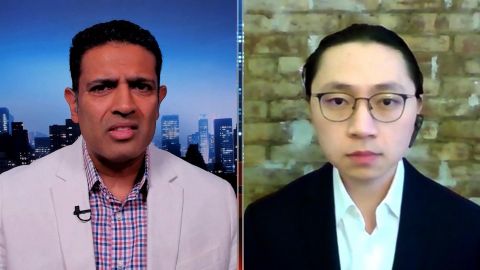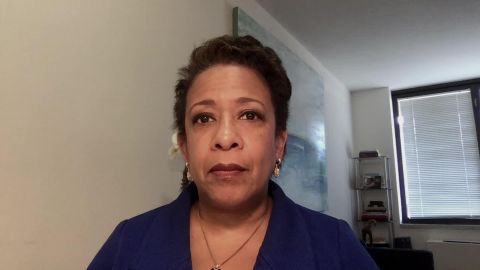Read Transcript EXPAND
CHRISTIANE AMANPOUR: We turn now to another pressing issue, though, with long-term consequences, the United States census. Each decade, the census attempts to count every person living in America and its five territories. That data then influences everything from voting districts to how many Electoral College votes a state gets to where federal funding goes. President Trump has long pushed to include a citizenship question in the census, which would effectively exclude undocumented migrants from the count. That directive was rejected by the lower courts. But, today, the administration has asked the Supreme Court to reconsider. Hansi Lo Wang is a national correspondent for NPR who reports on the people, power and the money behind the census. And here he is speaking to our Hari Sreenivasan about the importance of this 2020 count.
(BEGIN VIDEOTAPE)
HARI SREENIVASAN: Thanks, Christiane. Hansi, just so we have an overall importance of the census. I mean, sometimes people say, well, why is this discussion even happening? What are the consequences? What happens after an official census count?
HANSI LO WANG, NPR: What happens is, the country decides how it distributes, redistributes power and money for the next 10 yours, specifically, how many seats in the U.S. House of Representatives — there’s 435 seats — how many seats each state gets for the next decade. That’s dependent upon the latest state population counts that are determined by the U.S. census. That’s number one. And then that also has a direct impact on how many Electoral College votes each state gets for the upcoming, not the one in November, but the one after that, presidential election, and the one after that. Two presidential elections, the power that each voter has in determining who is the next president, that is determined by these census numbers. And beyond that, in 2021, states have to redraw voting districts, those political maps that determine what voting districts representatives, all the way down to school board members have — what districts they represent for the next 10 years. That’s supposed to happen next year. That’s based upon the census numbers, and money. There is a lot of money at stake here; $1.5 trillion a year are distributed — this is federal funding, federal tax dollars — are distributed based in part on the population counts, and this is funding for Medicare, for Medicaid, for other public services, including roads, schools. It’s really hard to overstate how influential these — this set of numbers is.
SREENIVASAN: Now, it takes a long time to count every person in the United States. How long has this count been going? Where are we at in that process?
LO WANG: This count officially started in January. I was in the Alaskan fishing village where it started, Toksook Bay, southeast coast, southeastern coast of Alaska. And it traditionally starts in the most remote places of Alaska. That’s the best time to try to find folks and make sure they’re home and they can be counted. And the count then continues on for a good part of the year. Because of the pandemic, that has been extended. This count was supposed to end, the counting, end of July. The Trump administration then pushed it back to originally the end of October. Now it’s set to end a month early because a change the Trump administration has made at the last minute end of September. And so it’s the greater part of the year at this point because of the pandemic, because, as you said, it is a hard job trying to count every person living in the country.
SREENIVASAN: Now, you just wrote a story recently looking at internal e- mails. And one of the e-mails points out, from career staffers, basically, we need all the extra time that you guys extended. Don’t make it shorter.
LO WANG: This is a career official saying they really need every single minute that was part of this extended schedule that the Trump administration originally approved and asked Congress for support for. This is back in April, a month after the coronavirus pandemic was declared a national emergency by President Trump. President Trump publicly supported it. And for more than three months, the Census Bureau has been operating as if it had this extended schedule to continue counting through October 31, and not have to deliver that — those first set of results until next year, 2021. But, at this point, Congress has not passed any laws extending that reporting deadline. And so December 31 is the deadline that the Census Bureau has, is working towards right now to try to get those latest state population counts. But there’s this tension here that, internally, Census Bureau officials have been really concerned that this shortened time period, that this — having to meet that December 31 deadline means that one of these — these internal documents say fatal errors, fatal problems with the data quality, that they could possibly produce results that would be deemed unacceptable for use, that they could be so inaccurate that researchers, local and state governments, may file lawsuits, may raise enough concerns that it could really jeopardize all the processes that happen after the census, the reapportioning of congressional seats, the redrawing of voting districts, as well as all the other uses of this really influential data.
SREENIVASAN: When you talk about data accuracy, it seems that there’s always almost this ecosystem of academics and researchers that all rely on this. But how do we double-check to make sure, how do we error-correct, so to speak, and where is that process this year?
LO WANG: Well, the Census Bureau always has these months built into their schedule. After the counting ends, the census is really not over. The public doesn’t see door-knockers anymore after the counting is finished. But there’s a lot of work happening at the Census Bureau headquarters, and as well as other processing centers. They are going through these results, all the results that they have collected. Some of them are duplicate responses, because people may have forgotten that they already filled out the census online and fill it out again, or maybe you have so counted in multiple households. These are all very frequently seen scenarios that the Census Bureau tries to find and try to correct for. And the Census Bureau originally had about between five and six months to do this, under this extended schedule that it was working under. Right now, under the shortened schedule the Trump administration has ordered it to follow, just about three months. And the concern here is that internally, the Census Bureau career officials have flagged that they may find serious errors in this data. After the counting is finished, they go through these results, they might find serious problems, and not have enough time to fix them. And so we may have to be living with a count, a set of numbers that have potentially serious errors for the next decade.
SREENIVASAN: So, how many states are on track vs. who are not? I don’t know which number is bigger.
LO WANG: Right now, the latest numbers that I have seen, that you only have three states that have hit a goal mark that the Census Bureau has set, which 99 percent of housing units enumerated. That’s the goal that they have set for every state as a marker of accuracy and of quality. And, so far, the latest numbers I have seen, only three states have hit that mark.
SREENIVASAN: Who is most affected by the undercounting?
LO WANG: Most affected are people of color, are immigrants, renters, rural residents, young children under the age of 5. These are all historically undercounted groups that, decade after decade, the U.S. census has not had accurate numbers of. And this is based upon the Census Bureau’s own research, where they send out teams to figure out, what is the undercount for these different groups? And it has found that there has been this persistent problem that the population numbers that the Census Bureau collects each decade overrepresents white people and underrepresents black people, Latinx people, Asian Americans, Pacific Islanders, American Indians. This is a persistent problem. And it has major implications on who gets political representation and who gets federal funding, who gets what share of that is distributed, and whether or not that is done in a fair way, based upon the actual population of the country.
SREENIVASAN: In addition to the pandemic, we have also got in parts of the country hurricane after tropical storm after hurricane, and then another part of the country, we have got wildfires. You have got people moving all about during this period. We have got people who’ve stayed in the same place since March, and they might not have gotten their census envelope in the mail to fill out or gone online to do it yet, right? I mean, how does the census correct for all of that in basically an additional, what, we have just a little more than a week left?
LO WANG: This is the major challenge facing the Census Bureau right now. The time is running out, based on this current schedule. And these are all scenarios that really are keeping a lot of Census Bureau workers up at night, because they’re very — some of them are very hard to try to work around. One major looming issue is, in the middle of this historic hurricane season, as well as these devastating wildfires hitting the West — in and along the West Coast right now, these could potentially develop into showstoppers in certain areas, meaning that in-person counting cannot take place possibly in these areas, at a time when the Census Bureau is actually about to roll out a really major part of operations. This is a counting of people experiencing homelessness, something that was supposed to happen in late March, the first day of April, has been pushed back because of the pandemic. And there’s only one slot to do that, according to the current schedule. It’s this week, for three days, just before the census counting is supposed to end. So, if there are any major storms, any major conditions because of wildfires, for example, that may prevent the counting of people experiencing homelessness, that could really raise a serious, serious conundrum for the Census Bureau. How do they reschedule that, given this very short time frame that they have?
SREENIVASAN: So what’s the role of the administration been in all of this? You have been following this for several months now. There were — there was this sort of debate over whether or not the citizenship question should be included. It was decided that it was not going to be included, but there’s still a lawsuit pending. Explain that to us.
LO WANG: There are multiple lawsuits pending. I have become a legal reporter on this census piece. The administration has made a number of decisions that have been challenged in the courts. Like you mentioned, the courts have decided, the Supreme Court has decided it cannot add a question about U.S. citizenship status to the forms. That’s generated a lot of attention. There are lawsuits over the Trump administration’s decision to abandon its extended timeline for the census and to shorten it, to end counting a month early. We will see how those play out. There are hearings scheduled for this week. And then there are another set of lawsuits I’m tracking. And they have they have to do with a presidential memo that President Trump issued in late July. It’s a memo that has since been blocked by a three-judge court in New York. But there are other legal battles going on. This is a memo that is calling for unauthorized immigrants to be excluded, not from the census in general, but specifically from the numbers used to determine how many seats in the House of Representatives each state gets, what’s known as the apportionment count. And this memo is being issued despite the 14th Amendment’s requirement. The 14th Amendment the Constitution requires that count include the whole number of persons in each state. But the Trump administration says that they want to exclude unauthorized immigrants from that number. And they are planning to appeal this ruling, this latest ruling from the New York court, three-judge panel in New York, all the way to the Supreme Court. So, this is going to be ongoing litigation that’ll be happening in the final — certainly the final weeks of the census counting and through the end of the year, likely.
SREENIVASAN: So, if I’m understanding this correct, the Trump administration’s argument is that you should not — if you’re not — if you’re not a legal resident of this country, you should not count in the number of representatives from your state, you are a person, but you shouldn’t be a citizen and count towards that larger number?
LO WANG: It’s a little bit more nuanced than that. The Trump administration — again, to be very clear, the census is still counting every person living in the country, regardless of citizenship status, regardless of immigration status. That is still happening. The Trump administration is making an argument that the president has discretion to determine who is included specifically in this count that determines how many seats in the House of Representatives each state gets. But a three judge court in New York has ruled that this has not really been a topic really for discussion, that the Constitution, the 14th Amendment, says the whole number of persons in each state. Congress has passed laws related to that requirement set up in the Constitution to say the president has to hand over essentially the total population, the whole number of persons in each state, as determined by the census, to Congress, so that Congress can carry on that process for determining how many seats in Congress each state gets. And, ultimately, the president plays a limited role in this process. One thing I do want to point out here is that the Trump administration has said they haven’t figured out a way yet how to do that, how to exclude unauthorized immigrants from the census count. And experts that I have talked to, census experts, say there is no — practically speaking, there is no legal way to do that. The reason is, because the census form does not include any question about a person’s immigration status. So, the Census Bureau ultimately has to create a set of estimates, and will have to use statistical sampling, which the Supreme Court has already ruled cannot be used when we’re talking about the count used to reapportion seats in Congress.
SREENIVASAN: So, regarding the influence of the administration, in all the documents and the e-mails that are becoming public as part of these lawsuits, and that, really, you’re one of the few people on the planet who’s probably read them all, is there a direct line between the White House and the people at the Census Bureau, any influence, any phrases that have been left out or highlighted?
LO WANG: Well, I think one thing to keep in mind here is that the Census Bureau is made up of predominantly career professionals. But there are specific roles at the Census Bureau that are political appointments. And what’s interesting is that the Trump administration has recently appointed three new positions at the Census Bureau, including two brand-new deputy director positions that have not been — that didn’t exist before, and have raised concerns amongst not only Democratic lawmakers, but professional associations of statisticians, economists, demographers, all major groups of researchers to academics, who rely on this information from the Census Bureau, and are really concerned that the administration has put in place appointees, that their qualifications are unclear. And it’s unclear exactly what their roles are. And, at this point, I haven’t found any specific e-mails from these appointees. They recently just joined over the past few months. But there are a lot of concerns surrounding what influence they may try to have on this process that is already ongoing in the last stages of conducting this count.
SREENIVASAN: Hansi Lo Wang from NPR, thanks so much for joining us.
LO WANG: You’re welcome, Hari.
About This Episode EXPAND
Former attorney general Loretta Lynch joins Christiane for an exclusive interview as part of the annual CNN Citizen forum. Climate activist Alexandria Villaseñor and former Sen. Harry Reid (D-NV) discuss the West Coast wildfires and global warming. NPR correspondent Hansi Lo Wang discusses the politicization of the 2020 census with Hari Sreenivasan.
LEARN MORE


